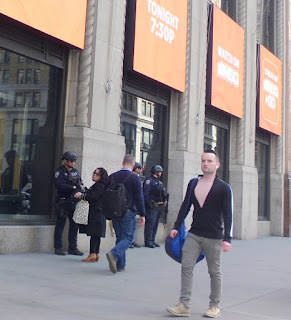(Originally published 12/4/12)
In this decidedly different age—simpler times, for sure—I included a “Saying of the Day” option on some of our primitively photocopied scorecards. "Sayings" ranged far and wide from a local pizza man named "George" to controversial and colorful Alabama Governor George Wallace. It seems that one member of our stickball entourage relished mimicking the latter’s distinctive southern drawl. A “Making of the President 1968” documentary, or some such program, aired on PBS at the time, because every single one of us knew where he was coming from when he impersonated Wallace shouting down an unkempt hippie heckler, imploring him to “Geeeeet a heeeeercut.” We were a unique and interesting brood of Bronx stickball players.
Courtesy of a pronounced rooftop clock and digital thermometer on the Exxon gas station just to the north of our playing field, both game-time temperatures—in Fahrenheit—and game durations were recorded for posterity as well. Let the record show that we played in temperatures ranging from forty-five to ninety-nine degrees. On one set of scorecards, I, for some reason, included “Hero” and “Goat” of the game blank spaces. Most of them were, in fact, left blank. Despite occasional unsolicited commentaries on the scorecards that were sometimes caustic and mocking, we generally opted not to underscore and offend individual games’ goats. While were a competitive lot, we had caring hearts, I suppose. And besides, we exchanged teammates from one game to the next. Sure, I scribbled at one point on a scorecard that “RC is a jerk,” and he responded in kind that I was meekly “sweating” under the pressure, but that was all in good fun.
Final season tallies found each and every one of us coming to the plate over one thousand times and pitching more than two hundred innings. Looking back, this heavy workload explains why I was often sore on Cardinal Spellman High School Monday mornings in springtime. There were no stickball spring training sessions for us. When winters turned into springs, we commenced to playing—up to the hilt and end of story.
Ah, but here we were all these years later, in the flesh, and having experienced lives after stickball—physical and emotional odysseys that have taken us a long, long way from the reassuring terra firma of a neighborhood high school with those crude home plate boxes on a graffiti-laden brick wall . Funny, but to a man, we recalled what was—very clearly as a matter a fact—but not so much the intricate details of the three decades that followed and that led us far afield of stickball in the Bronx. Why, exactly, I wanted to "assassinate" my longtime friend RC on a pleasant summer morning when Jimmy Carter was president, I've long since forgotten. I'd hazard a guess I really didn’t want to do that. And although stickball is now a relic of all our pasts—warm and fuzzy memories—we nonetheless continue to play ball with what we've got left in the autumn years.
(Photo from the personal collection of Nicholas Nigro)









